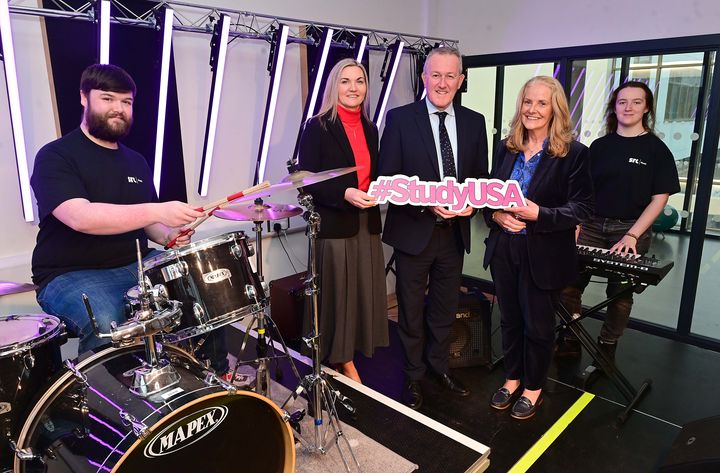
NEW YORK — U.S. stock indexes drifted lower Dec.
10 in the runup to the highlight of the week for the market, the latest update on inflation that's coming on Wednesday. The S&P 500 dipped 0.3 percent on Tuesday, a day after pulling back from its latest all-time high.

They're the first back-to-back losses for the index in nearly a month, as momentum slows following a big rally that has it on track for one of its best years of the millennium. The Dow Jones Industrial Average and the Nasdaq each fell 0.3 percent.
Technology titan Oracle dragged on the market. Its stock sank 6.7 percent after reporting growth for the latest quarter that fell just short of expectations.
It was one of the heaviest weights on the S&P 500, even though CEO Safra Catz said the company saw record demand related to artificial-intelligence technology for its cloud infrastructure business, which trains generative AI models. In the bond market, Treasury yields ticked higher ahead of Wednesday's report on the inflation that U.S.
consumers are feeling. Economists expect it to show similar increases as the month before. Wednesday's update and a report on Thursday about inflation at the wholesale level will be the final big pieces of data the Federal Reserve will get before its meeting next week, where many investors expect the year's third cut to interest rates.
NEW YORK — A judge has temporarily halted a proposed merger between supermarket giants Kroger and Albertsons, an action that could scuttle the deal. U.S.
District Court Judge Adrienne Nelson issued the ruling Dec. 10 after a three-week hearing in Portland, Ore. Harris Teeter parent Kroger Co.
and Albertsons in 2022 proposed what would be the largest grocery store merger in U.S. history.
But the Federal Trade Commission sued earlier this year, asking Nelson to block the $24.6 billion deal until an in-house administrative judge at the FTC could consider the merger's implications. Nelson agreed to pause the merger.
Regulators argue that combining the chains would be bad for consumers and workers by eliminating competition. The companies say a merger would help them better compete with big retailers like Walmart, Costco and Amazon. The case may now move to the FTC, although Kroger and Albertsons have asked a different federal judge to block the in-house proceedings.
DETROIT — General Motors said Dec. 10 it will retreat from the robotaxi business and stop funding its money-losing Cruise autonomous vehicle unit. Instead the Detroit automaker will focus on development of partially automated driver-assist systems like its Super Cruise, which allows drivers to take their hands off the steering wheel.
GM said it would get out of robotaxis "given the considerable time and resources that would be needed to scale the business, along with an increasingly competitive robotaxi market." The company said it will combine Cruise's technical staff with its own to work on advanced systems to assist drivers. NEW YORK — Alaska Airlines said Dec.
10 it will start new service to Tokyo and Seoul from its home base in Seattle next year as part of a plan to boost international flights over the next several years. The carrier also raised its fourth-quarter outlook and publicized a plan to boost profit by $1 billion over three years. It said greater efficiency from combining with Hawaiian Airlines will save the company at least $500 million by 2027.
Alaska also plans to introduce a new premium co-branded credit card; similar deals have been lucrative for other carriers. Alaska also announced a plan to spend $1 billion buying back its own stock, which makes existing shares more valuable. The airline's goal is to fly from Seattle to at least a dozen international destinations by 2030, using big jets owned by Hawaiian, which Alaska bought this year.
HONG KONG — China's exports slowed in November and its imports declined, falling below forecasts and underscoring potential weakness in trade at a time when its leaders are striving to boost the economy after the shocks of the COVID-19 pandemic. Customs data released Dec. 10 showed exports grew 6.
7 percent from a year earlier, down from a 12.7 percent increase in October. Analysts had estimated that exports had risen more than 8 percent.
Imports fell 3.9 percent from a year earlier, reflecting weak demand from industries and consumers. With exports outpacing imports, China's trade surplus rose to $97.
4 billion. The report came a day after Beijing pledged to loosen monetary policy and provide more support for the world's No. 2 economy, which is South Carolina's largest global trading partner.
U.S. President-elect Donald Trump has threatened to slap tariffs of 60 percent or more on imports of Chinese goods, complicating Beijing's efforts by threatening an area of the economy that has performed relatively well while the property sector remains in the doldrums and consumer spending remains fragile.
MEW YORK — Morgan Stanley Smith Barney will pay a $15 million penalty as part of a settlement with the Securities and Exchange Commission related to four financial advisers who stole millions of dollars of advisory clients' and brokerage customers' funds. The settlement announced late Monday is also related to the firm's failure to adopt policies and procedures designed to prevent and detect such theft. The SEC order said that MSSB failed to adopt and implement policies and procedures reasonably designed to prevent its financial advisers from using two forms of unauthorized third-party disbursements, Automated Clearing House payments and certain patterns of cash wire transfers, to misappropriate funds from customer accounts.
The order said the financial advisers, in Texas and California, made hundreds of unauthorized transfers from customers' or clients' accounts to themselves or for their own benefit. Morgan Stanley formed a venture with Citigroup's Smith Barney in 2009 and purchased the business outright in 2013. BEIJING — Chinese official broadcaster CCTV says a former chairman of the state-owned bank China Everbright Group has been jailed 12 years for embezzlement and bribery.
Tang Shuangning, who had also held senior posts at the People’s Bank of China and the China Banking Regulatory Commission, was arrested in January, part of a wider wave of prosecutions of senior officials accused of financial crimes. A court in the city of Tangshan, about 100 miles east of Beijing, found him guilty of taking advantage of his position at the state-owned bank in “seeking convenience for others” in jobs and loans, in exchange for illegal payments. The court said he had accepted illegal property with a total value of more than $1.
5 million..















